How Do Lit Mags Survive? A Look at Thema
 The Summer 2008 issue of Thema is the second of this quarterly’s celebration of 20 years in print. With the ongoing cycle of lit mags folding and new ones beginning, such anniversaries as this are indeed cause for celebration. It is also cause for curiosity: What does it take for a lit mag to survive?
The Summer 2008 issue of Thema is the second of this quarterly’s celebration of 20 years in print. With the ongoing cycle of lit mags folding and new ones beginning, such anniversaries as this are indeed cause for celebration. It is also cause for curiosity: What does it take for a lit mag to survive?
One of the features in Thema are letters to the editor run at the end of the publication. I was particularly drawn to these, the first from Tina M. Klimas, whose work was actually rejected, but her letter is in praise of Thema‘s process: “Although you were writing to decline my piece, I appreciated knowing that my work came close… I wanted you to know that your encouragement is valued…getting the poem back gave me an opportunity to improve it… So, thank you for giving me the chance to make a better poem.”
The second letter is from Matthew Petti, who writes about leaving his job as a clinical psychologist to pursue his writing: “I gave myself five years to get something published; if I didn’t get a bite in five years, I told myself, I’d give up.”
It was Thema that published Petti’s first short story back in 2000 (“Toby Came Today”). This encouraged his pursuit, leading to an MFA, an Assistant Professorship teaching writing and literature, and more publishing. He sums up the whole of this experience: “I’ve loved this part of my life’s journey, and your thumbs-up was the encouragement I needed to begin.”
Looking back on the question of how lit mags survive, it would seem one way would be in treating prospective writers and their submissions with respect, whether accepted or rejected, and offering the opportunity for new and developing writers to be given the chance with a poem or a story – whether it be their only one or the first of many. When we talk about the “community” of writers and publications, there are many facets involved. Reading these letters and taking a look at the long history of Thema, community seems apt to describe what they have built, and a viable one at that.
